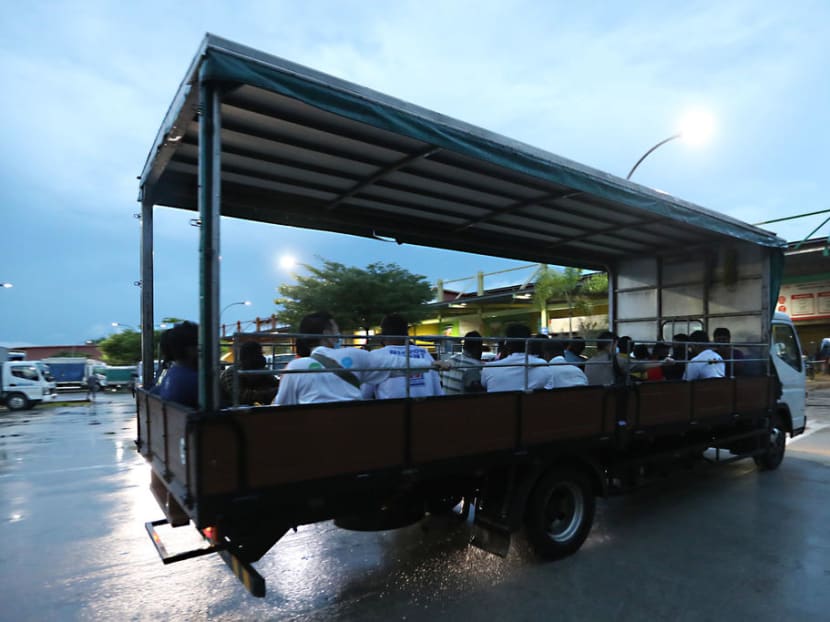Ideal not to ferry workers on lorries but more regulation would hurt industry, livelihoods: Amy Khor
SINGAPORE — Further regulation to make it safer to transport workers on lorries would likely affect the completion of various building projects, spell the demise of some companies and cause the loss of workers’ livelihoods, Dr Amy Khor said in Parliament on Monday (May 10).

The recent deaths of two migrant workers who were riding at the back of lorries have sparked fresh calls to have the practice banned.
- In an ideal world, workers would not be transported on lorries, Dr Amy Khor said
- Further regulation could cause the demise of some firms, she added
- The completion of building projects and workers’ livelihoods would also be affected
- The Government would continue to refine its policies and regulations to improve the situation, Dr Khor said
SINGAPORE — Further regulation to make it safer to transport workers on lorries would likely affect the completion of various building projects, spell the demise of some companies and cause the loss of workers’ livelihoods, Dr Amy Khor said in Parliament on Monday (May 10).
Despite this, the Senior Minister of State for the Ministry of Transport (MOT) gave assurances that the Government will continue to refine its policies and regulations, and engage stakeholders to further improve safety rules.
“From a road safety perspective, it would be ideal for lorries not to carry any passengers in their rear decks,” she said.
“But there are very significant practical and operational issues — on top of just cost considerations — which is probably why internationally, it is (a common) practice.”
Dr Khor was responding to questions fielded in Parliament over recent accidents involving migrant workers on the back of lorries, which resulted in numerous injuries and two deaths.
Member of Parliament (MP) Alex Yam for Marsiling-Yew Tee Group Representation Constituency (GRC) asked if MOT would consider transporting workers in mini-buses or buses with compulsory seat-belting, while MP Dennis Tan for Hougang constituency asked if there were any plans to review the carriage of workers at the backs of lorries or goods vehicles.
Dr Khor outlined steps taken a decade ago to improve safety, such as the installation of higher protective side railings and canopy covers, as well as having tougher penalties for non-compliance.
She said that compared to 10 years ago, further regulatory changes now would cause more “acute pain” to the industry, given the fallout from the Covid-19 pandemic with severe manpower shortages, delayed projects, and productivity being affected because of safety regulations
“Further regulations will likely have impact on the completion of various building projects, from (Built-to-Order Housing and Development Board projects) to MRTs to nursing homes and hospitals, (and it will) spell the demise of some companies and the loss of workers’ livelihoods.”
However, she added that “one fatality is still one too many” and that the Government will continue to conduct public education so that the lorry owners and drivers are reminded of the rules.
It will also continue to refine its policies and regulations, and will “continue to review the safety rules, engaging the various stakeholders along the way, to see how to enhance these measures further”.
Dr Khor said that as far back as 2008, a workgroup co-chaired by the Ministry of Manpower and the Land Transport Authority (LTA) had conducted a review on the safety of such workers, leading to the enhanced safety measures for lorries ferrying passengers.
Data from LTA showed that the average number of persons injured on board lorries for every 1,000 lorries from 2011 to 2020 is about 8.7, comparable to about 8.6 for every 1,000 vehicles for the total motor vehicle population during the same period.
The death rate for people on board lorries was nine a year on average from 2011 to 2015, and this dropped to 2.6 on average a year from 2016 to 2020.
However, the total number of deaths involving lorry accidents has been increasing since 2018.
Ms He Ting Ru, MP for Sengkang GRC, then asked Dr Khor if there will be studies done on how much costs will be increased if more safety measures are implemented.
“We need to understand how much costs will be increased, before we can have a meaningful conversation about whether or not there needs to be further safety measures put in place,” Ms He said.
In response, Dr Khor said that the issue goes “beyond costs”.
“At the ground, there are significant real, practical, and operational challenges on top of this cost consideration.”
However, she added that to estimate the extra costs in prohibiting the transportation of workers on lorries and goods vehicles, then a detailed study and consultation with the industry will have to be undertaken.
“So it is something that we can consider as part of the review.”








